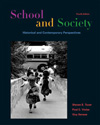 |  School and Society: Historical and Contemporary Perspectives, 4/e Stephen E. Tozer,
The University of Illinois, Chicago
Paul C. Violas
Guy Senese,
Northern Arizona University
Liberty and Literacy Today: Contemporary Perspectives
Professional Vocabulary- conventional literacy
- An account of literacy that accepts a minimal criterion, such as the ability to sign one's name, as evidence of the ability to read and write and that results in estimates of literacy rates in contemporary society from 97 to 99 percent.
- critical literacy
- An account of literacy that emphasizes not merely the ability to read and write but the ability to use reading and writing as the basis of higher-order thinking skills that allow a person to analyze and critically evaluate that which is read and written.
- cultural hegemony (ideological hegemony)
- An explanation of social harmony in the presence of deep social inequality; emphasizes the domination of public discourse by such a limited range of explanations that the disadvantaged lack access to alternative explanations of the social order that might mobilize resistance to powerlessness.
- cultural literacy
- A conception of literacy that emphasizes not the ability simply to read and write but the ability to make sense of what is read through familiarity with a wide range of cultural references and allusions.
- Freire, Paulo
- Born in 1921; author of Pedagogy of the Oppressed (1972); a Brazilian educator whose work was translated throughout the world in the 1970s and 1980s and after his death in the 1990s; seminal theorist in critical, liberationist pedagogy.
- functional literacy
- A conception of literacy that emphasizes the level of ability to read and write necessary to function well in a particular society.
- hidden curriculum
- A term coined by the educational researcher Philip Jackson in the 1960s to describe the socializing processes of schooling that are not described in the formal or academic curriculum.
- information marketplace versus marketplace of ideas
- A distinction designed to draw attention to the difference between the Jeffersonian ideal of an unfettered exchange of ideas in search of the truth and contemporary practices that package new ideas as products to be sold to the consumer.
- literacy as a cultural construction
- A concept emphasizing that what counts as literate, like how important it is to be literate, varies with the cultural context.
- mass media
- Broadcast, electronic, and print media that reach large proportions of the population nationally and internationally in the contemporary world.
- NAEP (National Assessment of Educational Progress)
- An ongoing longitudinal study of student learning in schools; sometimes referred to as "the nation's report card" because it is informative about educational progress across the United States.
|
|



 2002 McGraw-Hill Higher Education
2002 McGraw-Hill Higher Education